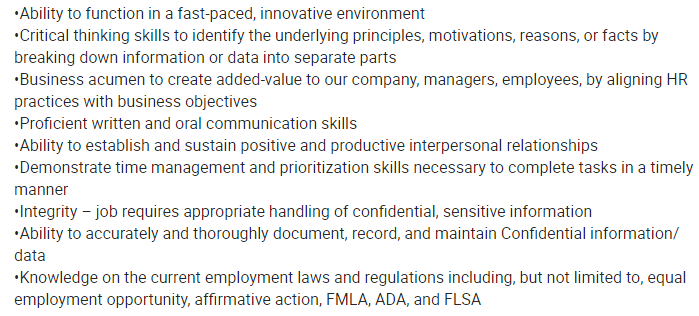First Job: Human Resources
Consider the following list of qualifications: This is an entry-level position in human resources, a field for which English and creative writing are always “related majors.”
This is an entry-level position in human resources, a field for which English and creative writing are always “related majors.”
Human resources is the work of recruiting potential employees, hiring them, getting them started in their jobs, and then resolving problems that arise. If you’ve helped a friend get hired at your work, if you’ve trained a new employee, if you’ve helped someone in trouble keep their job–you’ve already done work in this area.
Alumnus Theo Long, the Associate Director of Talent Management (“a fancy way of saying human resources”) for the U of I Office of Advancem ent was in the English department yesterday to talk about his own experience. It was a field he stumbled into, but the point where it became a career path, rather than simply a way to pay the bills, was the point where he realized he could make a difference in the lives of other people. Having seen on-the-job conflicts be mismanaged (“some managers just love to fire people”), he sought out a managerial role where he could help resolve conflicts supportively and constructively.
ent was in the English department yesterday to talk about his own experience. It was a field he stumbled into, but the point where it became a career path, rather than simply a way to pay the bills, was the point where he realized he could make a difference in the lives of other people. Having seen on-the-job conflicts be mismanaged (“some managers just love to fire people”), he sought out a managerial role where he could help resolve conflicts supportively and constructively.
There are a lot of entry-level roles in HR that do NOT require a graduate degree, particularly recruiting new employees. For those who want to advance in the field without committing to a graduate program, the Society of Human Resource Managers (SHRM) offers a certification program, which involves self-study, an exam, and a fee.
Theo also noted that an entry-level HR job can be a point of entry into an organization or an industry in which you may ultimately pursue other career paths: project management, communications, public relations.
Second Job: Advancement/Development/Fundraising
Higher education, not-for-profit organizations, philanthropy, social justice and political activism…all these kinds of organizations require donations to stay afloat. The work of of obtaining and managing those donations goes by many names. Theo Long’s HR job falls within the University of Illinois’s Office of Advancement which works with donors. Theo offered insight into the kinds of skills that are key for jobs in this area: not just the ability to ask people for money (though that is important) but also–a strong commitment to the mission of the organization that you’re raising money for, excellent listening skills, and curiosity. He also noted that advancement takes a lot of different forms: there is need for event planners, project managers, and researchers. A background in sales, customer service, organizing events for your RSO, and helping with fundraising in any capacity can make you eligible for an entry level job in this area. Theo also noted that the University of Illinois Foundation regularly seeks student employees to call alumni and seek donations. It’s not work that everyone takes to, but for anyone thinking about a career in the non-profit realm, it’s valuable experience.
Theo is a member of the Alumni Mentoring program, so feel free to contact him using your Alumni Mentoring Directory (and if you haven’t yet signed up for the Alumni Mentoring program, please set up an appointment with Kirstin Wilcox by emailing kwilcox@illinois.edu or calling 333-4346).


 So writes one of our alumni who works in the editing field (we’re currently updated our
So writes one of our alumni who works in the editing field (we’re currently updated our  deciding upon a definitive career path within the next two years.
deciding upon a definitive career path within the next two years. Illinois English alumni
Illinois English alumni